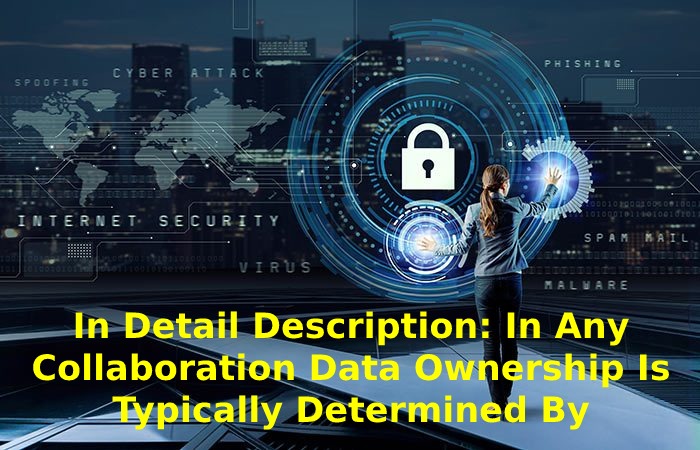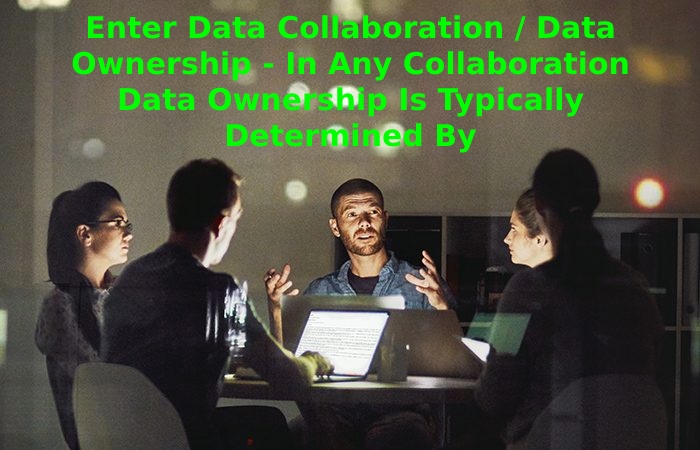Table of Contents
About – In Any Collaboration Data Ownership Is Typically Determined By
Data Ownership – In Any Collaboration Data Ownership Is Typically Determined By
In Any Collaboration Data Ownership Is Typically Determined By – There are a number of times where it is vital to know who has ownership of the project:
- Before allotment or printing data
- When blocking in collaborative or cross-educational projects
- When doing a job in an institution or on a project in a limited time frame
In all of these cases, it’s essential to understand whether any institutional or funder policies impact data ownership.
In the case of collaborations, all researchers must agree at the beginning of the project about how and when the data will be used and by whom.
If you’re a post-doc or a student, it’s essential to have a conversation with your advisor or lab director to make sure that there is a plan in place for what happens to your data if and when you leave.
What is a Data Management Plan (DMP)?
In Any Collaboration Data Ownership Is Typically Determined By – A DMP shows why information acquires or generated with the aid research done. It shows how data maintains, described, analyzed, and stored. At the closing of your project, the techniques used to share and store the data information.
The main advantage of writing a DMP is that it will allow thinking correctly about the procedure. It seeks to present weaknesses in the project and provide you to solve the problem. Maintaining DMP can prompt important information among the workers with documentation. All the students can get to work on the same page and get a lot of experience.
Data management planning is most effective in the early stages of a research project, but it is never too late to develop a data management plan.
Definition: In Any Collaboration Data Ownership Is Typically Determined By
Data collaboration is a procedure of getting together data from different internal and external sources. It uses to unlock joined data structures, for example, about the customers. In return, that helps create new projects and give services to customer experiences and deliver good business results. It is not similar to data sharing.
In Detail Description: In Any Collaboration Data Ownership Is Typically Determined By

If the data is new in the market, the companies hold the most high-quality information to get a better advantage. These companies are significant in the development of social media outcomes.
Companies around the world are occupied with collecting more data than ever before. From rapidly evolving industries like gaming, retail, and media to more old-fashioned sectors like automotive, financial services, and healthcare companies, data is key to transporting innovative products and services and powering rich consumer experiences.
Data collected directly by a firm known as first-party data. While highly applicable as it collects directly from consumers who interact with a firm, this data often only provides a single outlook on a consumer. For example, a gaming firm may know what gaming genre a player prefers, but they may not have insight into their hobbies and interests outside of gaming.
Enter Data Collaboration / Data Ownership – In Any Collaboration Data Ownership Is Typically Determined By

Data collaboration allows companies to gather data from numerous internal and external parties to unlock new consumer intellect. Collaborating with other companies that hold an extra piece of the consumer puzzle is a powerful way to discover further information informing the customer experience.
InfoSum: Data collaboration, not data sharing, Data Ownership – In Any Collaboration Data Ownership Is Typically Determined By
Each company wishing to collaborate has its own remote and secure cloud example known as a Bunker. Bunkers are unique to each firm, and only the data owner can ever access them. Think of Bunkers as an extension of a company’s infrastructure.
Permissions can remain decided for each party in the collaboration, allowing collaborative data analysis. Importantly, this never allowances another company admission to a Bunker or the data. Data certainly does not leave the Bunkers using our patented ‘non-movement of data technology. Instead, a mathematical demonstration is applicable to match customer records.
Also Read: Nail Your Big Data interview Don’t Appear Unprofessional
